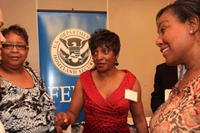We all know that having a career while married to someone in the military can be hard -- really hard. That's why so many military spouses have become home-based entrepreneurs or turned to direct sales.
While having your own home-based business may solve your career portability problems, it does open up a new world of other challenges, especially if you live in on-base housing.
Related: 3 Secrets for Military Spouse Entrepreneurs
Every business operated out of on-base housing is supposed to register with the housing office, and it's possible that it won't approve your request to operate on base.
Rules for having a home-based business are even more complicated overseas, where what you can and cannot do is based on the status of forces agreement (SOFA) with the host country.
For both stateside and overseas military spouses, it is best to check with on-base community relations or housing office for their specific rules.
Running a home-based business on base stateside
Every installation has its own rules about what kinds of businesses can and cannot run on base. Some of those rules are based on the service's regulations, while some are made at the base level.
For example, Fort Campbell, Kentucky, allows all types of businesses on base except animal breeding, provided they get approval from base officials. Schofield Barracks, Hawaii, on other the hand, automatically prohibits a variety of businesses including hair salons and personal training, according to officials there.
The Army in early 2019 announced an effort to standardize its on base business rules, but has yet to release or put in practice an official policy.
Most bases require residents to register their business with the housing office and receive a permit from the base to operate. The housing office may clear the business with the base's Morale Welfare and Recreation (MWR) office before giving its OK.
Depending on your location, they may also require that you have a state-issued business license.
Will your business be allowed?
Unless your business violates rules the base already has in place, such as Schofield Barracks' rule against selling food made in the home, your business will probably be approved.
But there is one big caveat: Before MWR gives a home-based business its blessing, local exchange officials have to sign off on it. That's because the exchange is given "right of first refusal" for 17 categories of businesses.
Related: Four of the Hardest Small Businesses to Run
For example, if you want to operate a photography business out of your home, you could be turned down. That's one of the businesses to which the exchange has first rights.
Here's the complete list of business categories the exchange could claim while shutting you down: retail stores; mail order, catalog and ecommerce services; automobile garages and service stations; name-brand fast food outlets; packaged beverage stores; barber and beauty shops; flower shops; laundries, dry cleaning and pressing; tailor shops; water repair shops; radio, TV, computer or electronic repair shops; shoe repair shops; photo studios; vending machines; taxicab or bus services; personal services; newsstands; pay telephone stations, telephone calling centers; and personal telecommunication services.
You're probably not going to run a vending machine out of your home. But many of these other categories could cover your would-be business.
Special rules for childcare
The only home-based business registration rules that seem to be strictly enforced across most bases are for in-home childcare.
On many bases if you are regularly providing more than 10 hours of childcare from your house for children who are not your own, you are required to become a certified family child care (FCC) provider. You must work with your base childcare services office to become certified, and you must accept the pay rates that they allow.
For more information on getting certified on your base, contact your base childcare office.
Can you advertise your business on base?
Generally speaking, advertising your home business on base is strictly forbidden. Most housing companies do not permit any kind of advertisement signs, and you are restricted from going door-to-door. You also can't hang fliers in public places.
If you are a registered childcare provider, advertising will be done for you by the childcare office.
What do you get by registering your business?
According to officials at Schofield Barracks, the biggest perk from registering and abiding by the on-base rules is "peace of mind."
But it could also help put you in the clear with any state-specific rules, which the base could help make sure you are following before it gives your business the OK. Ignoring state regulations and business taxes could potentially result in hefty fines, and no one wants that.
What happens if you don't register your business?
Of the self-employed spouses we spoke with while writing this article, most had operated an unregistered home-based business on base in the U.S. without knowing they needed to register. None of them had experienced repercussions for doing so.
Unless you're operating childcare or another highly visible business like personal training out of your on-base home or yard, officials are unlikely to notice and you're unlikely to be penalized or fined.
In some cases, spouses we spoke to had been told by housing officials that the business they were running out of their home, such as freelance graphic design, did not need to be registered despite written rules to the contrary.
But if you don't register when you should? If the housing office or MWR does have a problem with what you're doing, you could be sent a cease-and-desist warning or another kind of notice informing you that you need to register. If you continue to ignore the rules, you could be forced out of on-base housing or denied access to base.
Related: For the latest veteran jobs postings around the country, visit the Military.com Job Search section.
Looking for more job tips?
Sign up for a free Military.com membership to have military news, updates and job resources delivered directly to your inbox.
























